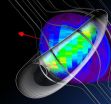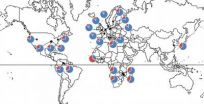(Press-News.org) How do our brains combine information from the external world (sensory stimulation) with information on our internal state such as hunger, fear or stress? NERF-scientists demonstrate that the habenula, a specific part in our brain consisting of neural circuits, acts as a gate for sensory information, thus regulating behavior in response to external stimuli.
Emre Yaksi (NERF – VIB/imec/KU Leuven): "Our brain has high levels of spontaneous activity, even in the absence of sensory stimulation. We think that this spontaneous neural activity in combination with sensory stimulation results in a particular internal state of the habenula. By this functional organization the habenula acts as a kind of switch board, selecting certain sensory information and sending it to the downstream brainstem areas. Thus the habenula regulats our behavior. It will be interesting to test whether experience or learning can alter the functional organization of these circuits."
Unraveling neural circuits
Neuroscientists all over the world are gradually unraveling the processes in our brain. However our brain still remains a mystery. The activity of single neurons and the functioning of 'one-to-one' interactions have been examined in detail. Yet, the information processing at the level of neural circuits is less well-understood. Emre Yaksi and his NERF-colleagues integrate neurobiology and nano-scale engineering to study brain function at multiple levels of detail. This multidisciplinary approach enables the researchers to look beyond the brain cells, and it provides them with great tools to study neural circuits and their link with behavior.
Exploring brain structures in zebrafish
Zebrafish is a useful model organism for neurological research. To find out how brains combine external and internal stimuli, Suresh Kumar Jetti, Nuria Vendrell Llopis and Emre Yaksi focused on the dorsal habenula (dHb) in zebrafish. The dHb is an equivalent of the habenula in mammals and relays information from the sensory areas to the brain region that regulates animal behavior under stress conditions. In zebrafish, the dHb receives input from cells of the olfactory bulbthus odors can trigger distinct behaviors (e.g. feeding, courtship, alarm).
Spontaneous activity is highly organized
The ongoing spontaneous activity in neurons was thought to be associated with several neurological phenomenons, such as sleep, or the learning and sensory process. The researchers observed that dHb is highly active even in the absence of any sensory stimulation. Moreover they showed that the spontaneous activity of dHb is not random but highly structured in the spatial clusters of neurons. Later the team showed that this spontaneous activity is very prominent during sensory stimulation and governs the odor responses in the dHb. The scientists their conclusion is that dHb acts like a switch board for the sensory information and is controlled by spontaneous activity.
INFORMATION: END
Our brain has switch board to guide behavior in response to external stimuli
2014-02-14
ELSE PRESS RELEASES FROM THIS DATE:
Inside out at the 2014 AAAS meeting: The impact of gut flora on diabetes and obesity
2014-02-14
In recent years, the 1.5 kilos of bacteria that live inside our bodies, mainly in the gut, have proven their crucial importance for our healthy functioning. Beyond their more obvious role in digestion, they are also involved, for example, in the development of the immune system and the neuronal system, and in the onset of certain diseases.
Three leading European researchers on the gut microbiome will share their recent findings on the relations between gut flora and obesity, diabetes, and cardio-metabolic diseases in general.
Links Between Human Gut Microbiota and Metabolic ...
NASA's IBEX helps paint picture of the magnetic system beyond the solar wind
2014-02-14
Understanding the region of interstellar space through which the solar system travels is no easy task. Interstellar space begins beyond the heliosphere, the bubble of charged particles surrounding the sun that reaches far beyond the outer planets. Voyager 1 has crossed into this space, but it's difficult to gain a complete global picture from measurements in only one direction.
Spacecraft data in the past five years from near Earth and cosmic ray observations have painted a better picture of the magnetic system that surrounds us, while at the same time raising new questions. ...
Impaired recovery from inflammation linked to Alzheimer's
2014-02-14
New research from Karolinska Institutet in Sweden shows that the final stage of the normal inflammatory process may be disrupted in patients with Alzheimer's disease. A study published in the journal Alzheimer's & Dementia shows that levels in the brain and cerebrospinal fluid of the molecules necessary for tissue recovery through the clearance of harmful inflammatory substances are lower than normal in patients with Alzheimer's disease. The study also showed association between the lower levels of these molecules with impaired memory function.
Alzheimer's disease is ...
Social norms strongly influence vaccination decisions and the spread of disease
2014-02-14
Our response to societal pressures about vaccination has a direct effect on the spread of pediatric infectious diseases in areas where inoculation is not mandatory, says new research published this week in Proceedings of the Royal Society B.
By incorporating social norms into predictive mathematical modelling, a research team from the University of Guelph and the University of Waterloo found that they can foresee the observed patterns of population behaviour and disease spread during vaccine scares—times when anti-vaccine sentiment is strong.
"If vaccination is not ...
New insight into protein misfolding in neurodegenerative disorders
2014-02-14
Research by the University of Southampton has provided new insight into the consequence of accumulated 'misfolded proteins' in neurodegenerative disorders, such as Prion and Alzheimer's disease.
Prion and Alzheimer's disease are protein misfolding brain diseases, where genetic mutations, or more commonly, interactions between an individual's genetics and environmental influences cause functional proteins in neurons to become misfolded or misrouted. In these diseases, there is a progressive death of nerve cells in specific brain regions, which is associated with the increasing ...
Geographical passwords worth their salt
2014-02-14
It's much easier to remember a place you have visited than a long, complicated password, which is why computer scientist Ziyad Al-Salloum of ZSS-Research in Ras Al Khaimah, UAE, is developing a system he calls geographical passwords.
Writing in a freely available "open access" research paper in the International Journal of Security and Networks, Al-Salloum emphasizes how increasingly complicated our online lives are becoming with more and more accounts requiring more and more passwords. Moreover, he adds that even strong, but conventional passwords are a security risk ...
Antimicrobial preservation strategies to prevent food contamination
2014-02-14
New Rochelle, NY, February 13, 2014—Food spoiling and poisoning caused by microbial contamination can cause major health, social, and economic problems. The broad scope of antimicrobial approaches to kill or prevent the growth of microorganisms in foods and beverages, including a variety of natural and artificial preservative strategies, are described in a comprehensive Review article in Industrial Biotechnology, a peer-reviewed journal from Mary Ann Liebert, Inc., publishers. The article is available on the Industrial Biotechnology website.
In the Review "Ingredient ...
New depression treatments reported
2014-02-14
MAYWOOD, IL – New insights into the physiological causes of depression are leading to treatments beyond common antidepressants such as Prozac and Zoloft, researchers are reporting in the in the journal Current Psychiatry.
Depression treatments on the horizon include new medications, electrical and magnetic stimulation of the brain and long-term cognitive behavioral therapy for stress management.
Authors are Murali Rao, MD, and Julie M. Alderson, DO. Rao is professor and chair of the Department of Psychiatry and Behavioral Neurosciences at Loyola University Chicago ...
Geographic variation of human gut microbes tied to obesity
2014-02-14
People living in cold, northern latitudes have bacteria in their guts that may predispose them to obesity, according to a new study by researchers at the University of California, Berkeley, and the University of Arizona, Tucson.
The researchers' analysis of the gut microbes of more than a thousand people from around the world showed that those living in northern latitudes had more gut bacteria that have been linked to obesity than did people living farther south.
The meta-analysis of six earlier studies by UC Berkeley graduate student Taichi Suzuki and evolutionary ...
What do women want? It depends on the time of the month
2014-02-14
If she loves you and then she loves you not, don't blame the petals of that daisy. Blame evolution.
UCLA researchers analyzed dozens of published and unpublished studies on how women's preferences for mates change throughout the menstrual cycle. Their findings suggest that ovulating women have evolved to prefer mates who display sexy traits – such as a masculine body type and facial features, dominant behavior and certain scents – but not traits typically desired in long-term mates.
So, desires for those masculine characteristics, which are thought to have been ...




